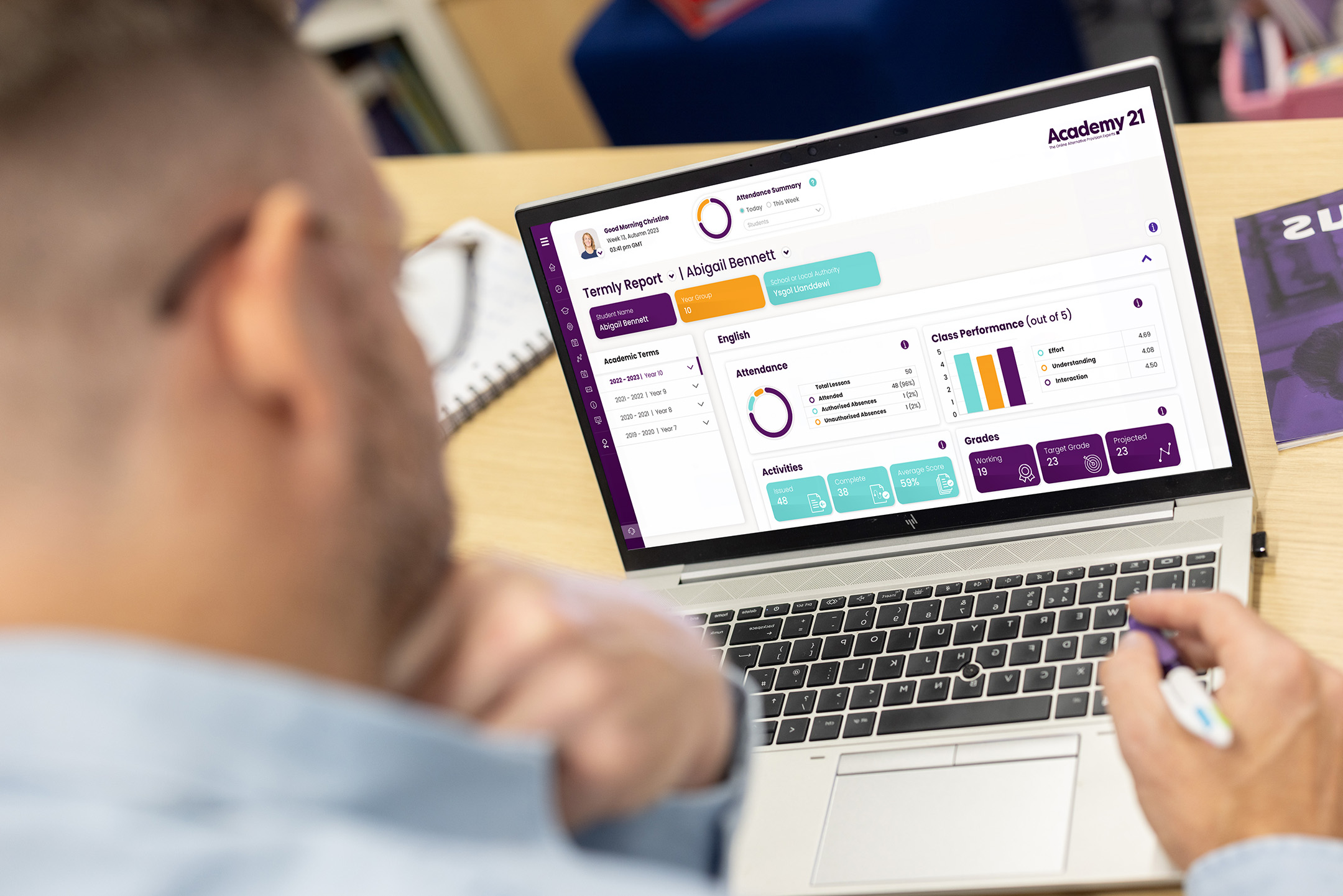Why you should consider hybrid learning with online AP

Over the last few years, we have witnessed the rise and success of hybrid learning models. The adoption of hybrid working, for instance, was a game-changer for many when it came to increasing productivity, motivation, and concentration. In education, hybrid learning can be a powerful solution to several challenges schools and students face.
In a recent survey, 83% of higher education students named convenience as a key reason why they are very pleased with the increasing effectiveness of online learning. A school can also benefit from using hybrid learning to provide additional, personalised support for those who need it via online alternative provision.
What is meant by hybrid learning?
Hybrid learning is an educational approach that merges in-person and online learning activities. It leverages the benefits of online learning to enhance the in-person experience, such as increasing accessibility for those with specific needs; increasing the rate of feedback and personalisation for those who need additional support; or enhancing student-teacher interaction with a wider array of communication tools.
Many schools have begun to make use of some models such as flipped learning or immersive experiences to enrich their students’ understanding of subjects and their engagement in class.
What is the difference between blended and hybrid learning?
Blended learning and hybrid learning are often used interchangeably, but they have distinct meanings. Blended learning is about enhancing traditional in-person classroom lessons with digital resources. This approach supplements face-to-face teaching with technology, such as online quizzes, video lectures, or interactive assignments, to improve the learning experience.
In contrast, hybrid learning is a mix of in-person and online learning. Students can attend some of their classes on-site and other classes fully remotely via an online alternative provision like Academy21, for example. Learning online doesn’t mean being disconnected from the school environment: students can join their online classes from home or from a designated space within the school.
Why do schools use live online AP for hybrid learning?
Often due to very limited alternative provision options, students may not be able to access the education they need despite a school’s best efforts. An online alternative provision is well placed to support hybrid learning models because it can provide students with quick access to high-quality learning and support that complements more traditional classroom learning.
Importantly, online AP can be used as part of a plan to reintegrate back into the physical classroom, using live or recorded lessons to fit around medical needs or as part of a support package to develop student reengagement and confidence.
From a school’s perspective, it is often an effective and timely early intervention that can be deployed before a situation for a student worsens, especially where the waiting lists or spaces in physical alternative provisions are significant. For example, this spring term at Academy21 we have seen over 40 students from schools across the UK with zero prior attendance now attend lessons with Academy21. We have also had over 250 students join us with persistent absence levels, who are now no longer persistently absent.
Online AP, such as that provided by Academy21, works highly effectively when connected to schools as students blend time on site with time at home, building up to reintegration – as identified in our OFSTED report.
First online alternative provision accredited by DfE

Who is using online AP as a hybrid learning model?
Now, almost all schools have experience of hybrid and online learning from the Covid era, an experience marked by the dedication of schools to keeping their students on track. Interestingly, hundreds of schools have realised its benefits and continued this model.
At Academy21, we have had over 5500 students using our AP this academic year. All our students were enrolled by schools seeking the benefit of online learning for attendance, specialised support, and reintegration. Many of these students start as part of hybrid models, mixing on site education with online learning through Academy21.
In many cases, online lessons take place in the school building and work effectively because of their flexibility. They can fit around a student’s other school commitments and are completely aligned to the curriculum taught in schools. All online classes are delivered live by expert teachers who leverage innovative, effective teaching methods to engage students and facilitate learning, especially for vulnerable learners.
What are the benefits of hybrid learning?
Many parents, carers, and even schools, may have an idea of online education as that of pandemic times. Yet, pandemic remote learning was a temporary solution built under immense time and resource constraints. The reality of online alternative provision is very different, with teaching and resources designed deliberately for the online classroom. Here are some of the key benefits of online AP and how it can support hybrid models:
1. Expertise in online teaching
In online alternative provision, subject expert teachers are also experts in teaching in online environments. They know the differences of learning online versus in-person and adapt teaching methods to drive the maximum engagement and ensure students absorb the content effectively.
2. Continuity in education, no matter your challenges
Online AP offers flexible timetables that will fit within your school’s own timetable and a student’s specific needs. Plus, its programmes are aligned to UK curriculums, offering continuity of learning. Because this consistent teaching is delivered on site, teacher absence or resourcing and recruitment challenges do not interrupt the student’s experience.
3. Seamless integration with schools
Online AP allows a phased return to be more effective, because it can be completely blended with the school. From browser-based platforms to AI to live IT support, seamlessly integrated technology fits in with a school’s IT infrastructure and enables students to consistently engage with online learning within the school building.
4. Specialist SEN support
Specialist SEN support services complement the support schools may already have in place, giving access to specialists and additional services that fit around interventions students may be receiving elsewhere. Online classrooms are designed for collaboration online and offer multiple means of participation for students with additional needs. There is always a way for even the most anxious student to share their ideas with peers or privately with the teacher.
5. Communication and monitoring
Academy21 offers daily reporting via our Mentor Portal to keep schools up to date with all aspects of learning. This makes planning careful reintegration and reporting to parents and their physical class teachers highly informed. It also means that students can be recognised for their efforts just like peers.
Lastly, our safeguarding arrangements are designed for the online school and work alongside a school’s team and arrangements, with immediate updates and follow-up. We work collaboratively with schools to deliver the best learning experiences and outcomes to their students.

The models of hybrid learning
We see different models being used across schools, often designed locally to fit with student’s specific needs and resources.
Dedicated inclusion spaces in mainstream schools use Academy21 to ensure students who need respite have continuity of learning. This enables other services and professionals to flexibly connect with students and allows other intervention to occur without learning loss and a greater sense of routine. Moreover, it can be supervised effectively by a range of school professionals because it is delivered within the building and the learning and feedback from live lessons are recorded and catalogued. The level of insight this gives ensures effective reintegration can be planned.
School-home model where students divide their learning between the classroom, flexible spaces in school, and their home. This flexible model supports students with significant absences, building confidence and routines that encourage them to return to the school environment. Usefully, it is flexible enough to ensure a student does not miss learning if the reintegration plan needs a rethink.
Specialist provisions in mainstream schools where Academy21 is used to provide the curriculum learning on site in specialist provisions. This is a powerful model, supplementing the great teaching of teachers on site with subject expertise and support of online teachers.
The challenges of hybrid learning, and how to overcome them
1. Who is hybrid learning for?
As with any new initiative, it is important to consider who exactly you think it will work for. Hybrid online schooling can work for a huge array of students, but their needs will be unique to your context. Careful planning and realistic resourcing are needed to ensure it works effectively.
It is helpful for leaders to ask questions such as:
- How will the hybrid provision be staffed on site?
- What kind of location on site is required to ensure the environment works for those young people?
- At what point should a student be enabled to use hybrid learning? Will it be a fixed-term solution for respite or an ‘upstream solution’ to prevent initial challenges from worsening?
- How are you provisioning devices to ensure all students can access their lessons?
At Academy21, we use client success stories with hybrid models to refine our services, aiming to provide a flexible timetable, comprehensive program, and guidance for successful implementation in other schools and organisations.
2. Using a specialist provider
Secondly, consider how you will use specialists. Students in hybrid education often have SEN or medical needs and deserve an education equal to their peers. This means high-quality teaching, regular feedback, and welfare support. However, schools may face challenges in providing these accommodations due to limited resources.
So, Academy21 provides expert, high-quality teaching in a bespoke platform that is designed for learning online. By using a specialist online provider within your school setting, you ensure continuity in your students’ education, and minimise pressure on staffing and resources.
3. Monitoring
Leaders want to ensure they have the right oversight to keep any use of hybrid online AP on a positive trajectory. Therefore, making sure you have a leader who is accountable for the success of the provision is key. This individual or team can work in partnership with your online provider, closely monitoring student performance and progress to ensure return on investment. The key here is to have a provider or platform that gives up-to-the lesson updates on the student’s engagement, attendance and, ideally, live lessons so the students are actively monitored.
4. ‘Buy-in’
Online is different. Families’ views may be mixed, especially has people may have pre-conceived ideas of online education.
Our schools feedback to us that they need to address these perception issues around online learning. Where schools assume parents/carers will understand what online ‘looks like,’ or be convinced by the technological aspects or where they assume the digital savvy of young people, there can be issues.
Ultimately, you aim to promote behaviour change by fostering positive attitudes toward online learning. Highlighting its integration into the school community and ensuring robust IT support for seamless access to classes and materials are vital. As is eliminating barriers to learning for those students alongside ensuring leaders and pastoral staff can confidently articulate and support the plan.
If you are interested in implementing hybrid models in your school through Academy21, reach out to our team below.
Written by
Academy21
Posted on
03/07/2024
Updated on
29/08/2025
Topic
Student successPost type
Blog


